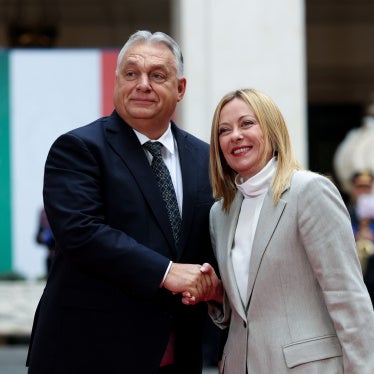War criminals should not be shielded from justice in order to reach a political settlement in Kosovo. As Serbian-Albanian negotiations over the disputed province got underway outside Paris, Human Rights Watch released a new report "A Week of Terror in Drenica" with further evidence of Yugoslav government atrocities in the conflict.
Human Rights Watch called on the Contact Group of nations dealing with the former Yugoslavia to ensure that a political settlement does not stand in the way of Yugoslav President Slobodan Milosevic and his top military planners being held accountable for atrocities committed by government forces in Kosovo. These include attacks on civilians, the destruction of civilian property, and summary executions -- all war crimes under international law.
In the report released today, "A Week of Terror in Drenica," Human Rights Watch presents new, detailed documentation of Yugoslav government war crimes in the Drenica region of Kosovo during the last week of September 1998. The report describes how special units of the Serbian Ministry of Interior massacred twenty-one members of the Delijaj family, all of them civilians, in Gornje Obrinje, and then summarily executed thirteen men in the neighboring village of Golubovac. Most of the surrounding villages were systematically looted and destroyed, even though government forces faced no resistance.
An appendix to the report provides Human Rights Watch's newest findings of the massacre in Racak on January 15, 1999, in which special forces killed forty-five ethnic Albanian civilians. The massacre sparked the latest crisis in Western policy toward Kosovo and led to today's negotiations in Rambouillet.
"After a tragic delay, the international community is finally addressing the Kosovo crisis with resolve," said Kenneth Roth, Executive Director of Human Rights Watch. "But any political settlement must ensure accountability for these terrible crimes."
Roth called on the countries of the Contact Group (Russia, France, Great Britain, the U.S., Germany, and Italy) to increase their financial and political support for the war crimes tribunal in The Hague, officially known as the International Criminal Tribunal for the Former Yugoslavia. The international community should press the Yugoslav government to guarantee full access for war crimes investigators, he said, and to arrest indicted war criminals on its territory. Intelligence information, such as the recorded telephone conversations released last week between Yugoslav Deputy Prime Minister Nikola Sainovic and General Sreten Lukic over the massacre in Racak, should be regularly provided to the tribunal.
The war crimes tribunal has a United Nations mandate to investigate and prosecute war crimes committed in Kosovo, but the Yugoslav government has rejected its jurisdiction and blocked its investigators.
Human Rights Watch also stressed that the Kosovo Liberation Army (KLA) has committed serious abuses, including the taking of hostages and extrajudicial executions. These atrocities have been documented in previous Human Rights Watch reports and will continue to be the subject of investigation. Under no circumstances, however, can the Yugoslav government use abuses by the KLA as justification for committing abuses against ethnic Albanian civilians.
"The Contact Group should recognize that no political deal will last if atrocities are left unpunished," Roth said. "Settlements without justice for past crimes are inherently unstable."







